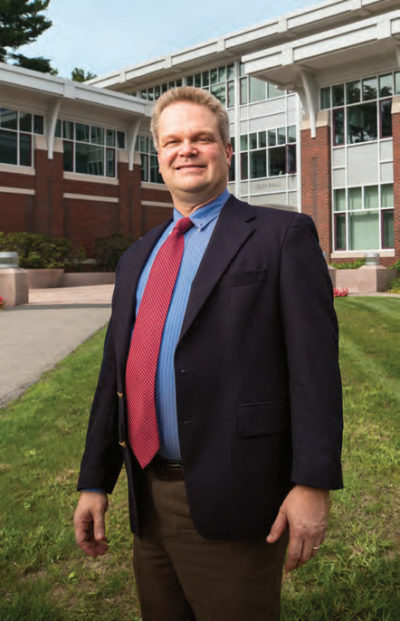Keith Rollag is from South Dakota. And, since his first day in the classroom more than 17 years ago, he has never encountered a student from his home state. “The first question I ask in every course I’ve ever taught, or even any talk I’ve ever given, has been ‘Anybody here from South Dakota?’ Nobody has ever raised their hand. I’m hoping that one day, I’ll have somebody in my class from South Dakota.”

Photo: Tom Kates
Keith Rollag, Murata Dean of the F.W. Olin Graduate School of Business
For seven years, he worked at Procter & Gamble. After graduating with a degree in chemical engineering, Rollag took a job in product development. “I spent several years designing Pampers baby diapers. If you had told me that as a college student, I would have said there’s no way. But actually it was a fascinating product and a competitive industry.” After a few years, Rollag was looking for a more entrepreneurial endeavor within the company, so he transferred to its R&D division in Japan. “I got my passport, started taking some Japanese lessons, and six months later took my first trip out of the country to move to Japan. I spent almost five years there as a product development manager and then as a technical training manager.”
His Ph.D. is in industrial engineering with a focus on leadership. “I was interested in leadership, because I found that in technology development, the technology is often the easy part. It was leading, influencing others, and making changes that was the hard part. So I was at Stanford for about six years, and I focused specifically on newcomers and how you bring them into organizations.”
In the next few years, he sees big changes in graduate education. “It’s changed a lot already in terms of what people are looking for in their education, but it’s going to change so much more. The newer generation of prospective students wants something that’s—in the words of David Abdow, the dean of Executive and Enterprise Education— just in time, just enough, and just for me.” Babson will remain what Rollag calls “high touch,” meaning it will continue to value strong interactions among faculty, staff, and students. But the College also plans to rethink the structure of its MBA, with a smaller core and more electives, and it will expand offerings of smaller, less expensive credentials such as certificates. “This will make it easier for us to adjust our portfolio and learning experiences to match market demands. We’re also giving students the flexibility to tailor their learning experience to their goals and life constraints.”
Education is not just about information anymore, says Rollag. “A lot of what people went to business school for before is now obtainable through two clicks on Google. There are countless articles and videos on leadership and business and entrepreneurship. I was at an HR conference, and a speaker said that by 2030, you’d better be out of the credential-selling business, or you won’t be here. People come to Babson to solve a professional development challenge, whether they want to be promoted or change careers or start a business. And we help them solve the challenges they are dealing with today. We don’t just provide information. We provide professional and business development solutions to individuals and organizations.”—Donna Coco
